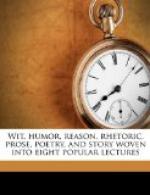The child was brought and as her sweet blue eyes tenderly looked at the face of the dying man he smiled, and then the spirit took its flight, to where He who died to save the world, looked with compassion upon the tramp who gave his life for “one of these little ones.”
Oh, the beauty and power of human touch!
The Panama Canal is considered the glory crowning achievement of this century; but the building of a highway of sympathy over which to send help to the hopeless is a far greater achievement. If this republic is to endure with the stars; if it is to go down the ages like a broadening colonade of light, and stand in steady splendor at the height of the world’s civilization; it will not be because of its money standard, its tariff or expansion policy, but because the heart-beat of human brotherhood sends the blood of a common father bounding through the veins of the concentrated whole of humanity, binding high and low, rich and poor, weak and strong together.
“Work brothers; sisters work; work
hand and brain,
We’ll win the golden age again;
And love’s millennial morn shall
rise
In happy hearts and blessed eyes.
We will, we will, brave champions be
In this the lordlier chivalry.”
III
OUR COUNTRY, OUR HOMES AND OUR DUTY. A PLEA FOR THE HOME AGAINST THE SALOON.
The sweetest word in the language we speak is home. No matter in what clime or country, whether where sunbeams dance and play or frost fiend rules the air, there’s no place like home. At the World’s Fair in Chicago I visited the Eskimo village. To a woman who could speak English I said: “How do you like this country?”
“Beautiful, beautiful country. Oh, the flowers, the green grass, the lovely homes!” was her reply.
But when I ventured to ask: “Will you remain here after the fair and not return to your land of ice and snow,” she shook her head and said: “No, I want to go home. I am so homesick.”
“Be it ever so humble, there’s no place like home.” In Lexington, Kentucky, there is a modest looking house, nestled mid linden and locust trees. Visitors who pass in quest of historic spots about the far-famed city, seldom give even a glance at that humble abode. Yet when I am far away, whether in the wonderful west with its scenic grandeur, or in the east surrounded by mansions of millionaires, my heart goes back in memory’s aeroplane to the old Blue Grass town, where six generations of my family sleep, the dearest spot on earth to me—“home, sweet home.” When years ago I was nearing the end of a three months’ lecture tour in California, a friend invited me to join him on a visit to Yosemite Valley, saying: “You will see the grandest scenery and biggest trees in the world.” My reply was: “I thank you very much, but my engagements in the golden west close on the eighth and I will start east on the ninth; my old Kentucky home is grander to me than Yosemite Valley and my baby bigger than any tree in California.”




